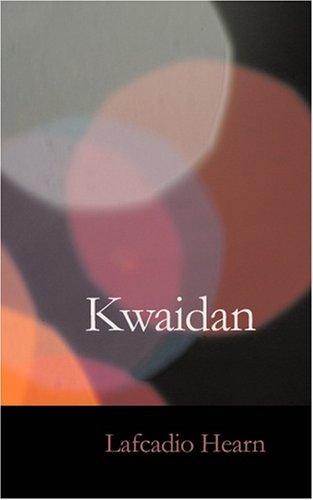异圈 reviewed 怪谈 by Lafcadio Hearn
希望我有读原文的能力
3 stars
翻译的口吻令人不适,错别字更是……为此扣一星。如果有选择还是看看别的译本吧。
要说惊喜算不上了,但确实经典。有一些甚至显得很「现代」,甚至可以说是富有「电影感」。

Paperback, 124 pages
English language
Published May 23, 2007 by BiblioBazaar.
"Kwaidan" translates from the Japanese as weird tales, which perfectly describes these haunting stories. This collection of supernatural tales includes a musician called upon to perform for the dead, man-eating goblins, and insects who uncannily mimic human behavior. A perfect treat for fans of the strange and otherworldly.
This collection of Japanese supernatural stories is a classic work in the field of Japanese horror.
Known primarily as an early interpreter of Japanese culture and customs, the famous writer Lafcadio Hearn also wrote ghost stories—"delicate, transparent, ghostly sketches"—about his adopted land. Many of the stories found in Kwaidan, "stories and studies of strange things," are based on Japanese tales of long ago told to him by his wife; others possibly have a Chinese origin. All have been re-colored and reshaped by Hearn's inimitable hand.
Some critics attribute Hearn's fascination with eerie tales to his partial blindness. Whatever its roots, he was …
"Kwaidan" translates from the Japanese as weird tales, which perfectly describes these haunting stories. This collection of supernatural tales includes a musician called upon to perform for the dead, man-eating goblins, and insects who uncannily mimic human behavior. A perfect treat for fans of the strange and otherworldly.
This collection of Japanese supernatural stories is a classic work in the field of Japanese horror.
Known primarily as an early interpreter of Japanese culture and customs, the famous writer Lafcadio Hearn also wrote ghost stories—"delicate, transparent, ghostly sketches"—about his adopted land. Many of the stories found in Kwaidan, "stories and studies of strange things," are based on Japanese tales of long ago told to him by his wife; others possibly have a Chinese origin. All have been re-colored and reshaped by Hearn's inimitable hand.
Some critics attribute Hearn's fascination with eerie tales to his partial blindness. Whatever its roots, he was clearly drawn to the hidden realms of the spirit world and to strange facts and marvels. In this collection of unforgettably haunting stories, Hearn brings together "the meeting of three ways"—the austere dreams of India, the subtle beauty of Japan and the relentless science of the Western world.
Japanese ghost and supernatural tales include:
About the Author: Lafcadio Hearn (1850-1904) was born on the Greek island of Lefkas, the son of an Anglo-Irish surgeon in the British army and a Greek mother. After his parent's divorce when he was six, he was brought up in Dublin by a great aunt. At the age of nineteen, he went to America, eventually ending up in New Orleans as a newspaper reporter. His flight from Western materialism brought him to Japan in 1890, where he worked for an English newspaper, the Kobe Chronicle, and taught in various schools. In 1896, he began teaching English literature at Tokyo Imperial University, a position he held until 1903, and at Waseda University. Hearn married a samurai's daughter, Koizumi Setsu, became a Japanese citizen and a Buddhist, and changed his name to Koizumi Yakumo. At the young age of 54, he died of a heart attack. Hearn's search for beauty and tranquility, for pleasing customs and lasting values made him a confirmed Japanophile. His keen intellect, poetic imagination, and wonderful clear style permitted him to penetrate to the very essence of things Japanese. He became the great interpreter of things Japanese to the West. Hearn's most famous work is a collection of lectures entitled Japan: An Attempt at Interpretation (published posthumously in 1905). His other books on Japan include Glimpses of Unfamiliar Japan (1894), Out of the East (1895), Kokoro (1896), Gleanings in Buddha Fields (1897), Exotics and Retrospectives (1898), In Ghostly Japan (1899), Shadowings (1900), and A Japanese Miscellany (1901).
翻译的口吻令人不适,错别字更是……为此扣一星。如果有选择还是看看别的译本吧。
要说惊喜算不上了,但确实经典。有一些甚至显得很「现代」,甚至可以说是富有「电影感」。